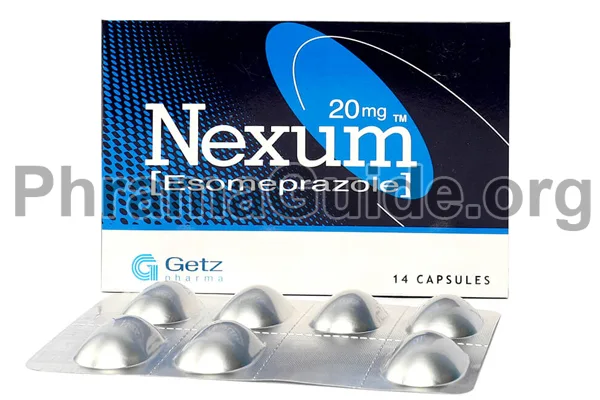Nexum is a medication that belongs to a class of drugs known as proton pump inhibitors (PPIs). It is primarily used to reduce stomach acid production and is commonly prescribed to treat conditions such as gastroesophageal reflux disease (GERD), peptic ulcers, and Zollinger-Ellison syndrome. Like all medications, Nexum can have side effects, although not everyone will experience them.
Common Side Effects
- Headache
- Nausea
- Diarrhea
- Abdominal pain
- Flatulence (gas)
- Constipation
- Dry mouth
Less Common Side Effects
- Dizziness
- Rash
- Itching
- Fatigue
- Muscle pain
- Joint pain
- Changes in blood cell count (very rare)
- Liver problems (very rare)
- Kidney problems (very rare)

What is Nexum?
Nexum is one of the leading brands of Esomeprazole, manufactured and marketed by Getz Pharma Pakistan.
Nexum : Available Formulations and Strengths
Presently, Nexum is available in Capsules Form
Nexum Capsules : 20mg and 40mg Strengths
What Are The Possible Drug Interactions of Nexum?
- Medications that Reduce Stomach Acid: Combining Nexum with other drugs that reduce stomach acid, such as other proton pump inhibitors (PPIs) or H2-receptor antagonists (e.g., ranitidine), may not provide additional benefits and could increase the risk of side effects.
- Clopidogrel: Combining Nexum with the antiplatelet medication clopidogrel may reduce the effectiveness of clopidogrel. If you are prescribed both medications, discuss the potential interaction with your healthcare provider. They may recommend alternative acid-reducing medications.
- Antifungal Drugs: Certain antifungal medications, such as ketoconazole and itraconazole, may have reduced absorption when taken with Nexum. These antifungals should be taken at least 2 hours apart from Nexum.
- Methotrexate: Nexum can increase the levels of methotrexate in the blood, potentially leading to toxicity. If you are taking methotrexate, your healthcare provider will need to monitor your methotrexate levels and adjust your dose as necessary.
- Digoxin: Nexum may increase the absorption of digoxin, a medication used for heart conditions. Your healthcare provider may need to adjust your digoxin dose if you are taking Nexum.
- Warfarin: There have been reports of changes in international normalized ratio (INR) values when Nexum is taken with warfarin, a blood thinner. Close monitoring of INR levels is essential if you are on both medications.
- Tacrolimus: Nexum may increase the levels of tacrolimus, an immunosuppressive medication. Your healthcare provider may need to adjust your tacrolimus dose and monitor your blood levels closely.

Leave A Comment